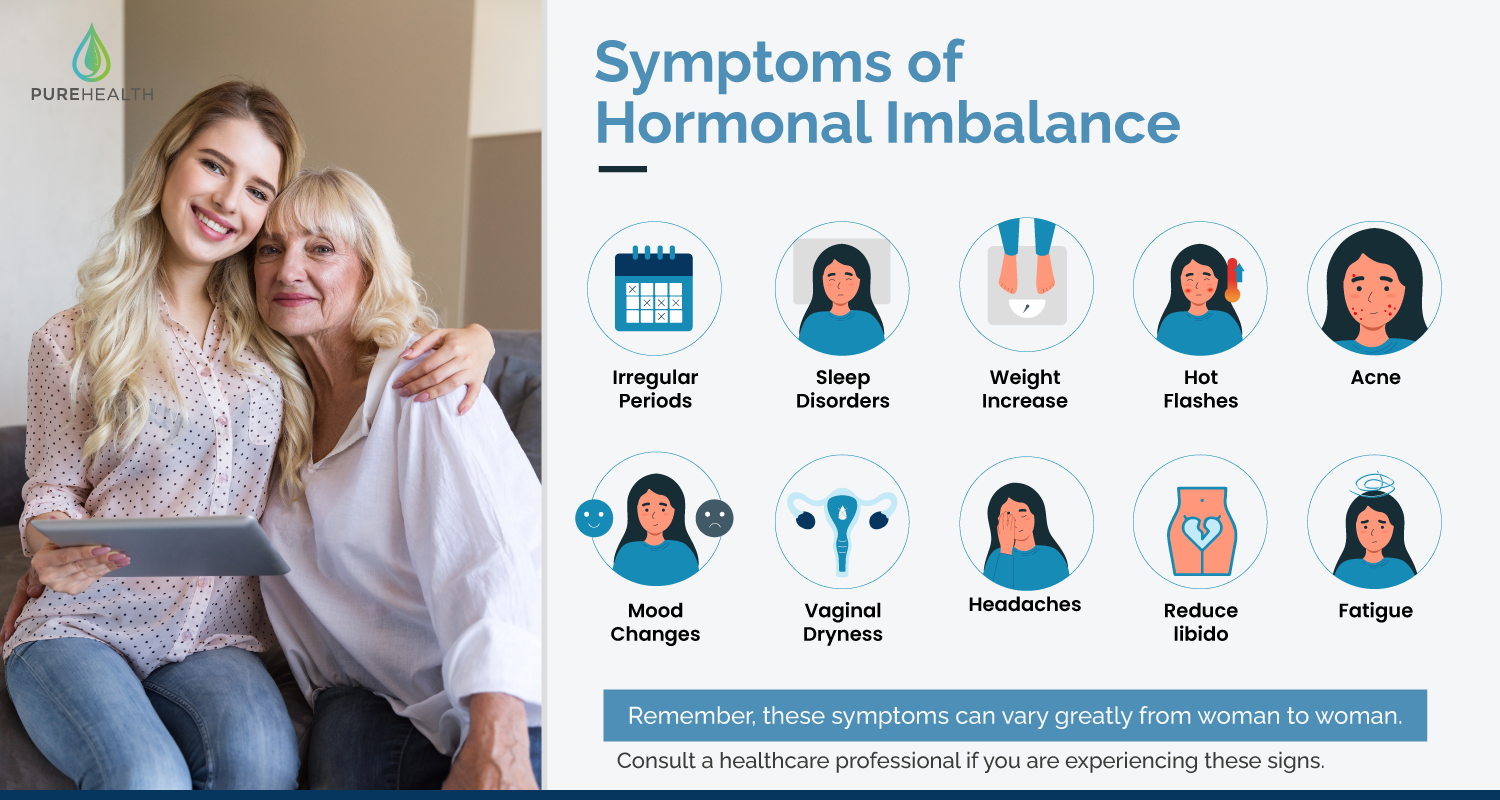Understanding Hormonal Imbalances in Women: Symptoms and Solutions
What is Hormonal Imbalance in Women?
Hormonal imbalance in women occurs when the levels of hormones like estrogen, progesterone, testosterone, and cortisol are out of balance. The body relies on these hormones to regulate all processes including digestion, reproduction, energy production, and mood. When these hormones become imbalanced due to age or external factors such as stress, it can cause various uncomfortable symptoms.
Hormonal imbalance is more than just a blip in the body's internal rhythm. It's a disorder that can significantly disrupt a woman's daily life, affecting her physical health, emotional well-being, and overall quality of life. Some women experience hormonal imbalances as part of natural processes, like menstrual cycles, pregnancy, or menopause. However, external influences such as an unhealthy lifestyle, stress, lack of sleep or certain medications can also trigger an imbalance. The endocrine system, which produces hormones, is exquisitely sensitive and finely tuned. Even tiny changes can have widespread effects throughout the body. Understanding hormonal imbalance is the first step to identifying, managing, and treating the conditions it causes.
What are the Signs of Hormonal Imbalance in Women?
The most common signs of hormonal imbalance in women include irregular periods, hot flashes, difficulty sleeping, weight gain, mood swings, and fatigue. Other possible symptoms include reduced sex drive, anxiety or depression, low libido, poor concentration, hair loss, and acne.
In addition to the aforementioned symptoms, hormonal imbalances in women can also lead to more specific physiological changes. These may encompass unexplained weight loss or gain, excessive sweating, persistent headaches, a noticeable change in the rate of heartbeats, and frequent urination.
Some women may also experience symptoms related to their breasts such as tenderness or frequent infections. Changes in appetite, bouts of constipation or diarrhea, dry skin or skin rashes, and changes in blood pressure or blood sugar levels are other potential indicators of a hormonal imbalance. Remember, these symptoms can vary greatly from woman to woman. It's essential to consult a healthcare professional if you are experiencing these signs.
Is Hormonal Imbalance Serious? What Can Happen if Untreated?
If left untreated, hormonal imbalances can lead to a variety of health problems such as infertility, endometriosis and PCOS (polycystic ovarian syndrome). If left untreated for an extended period of time, it can also lead to severe health issues such as stroke, heart disease, and cancer.
Hormonal imbalance, while seemingly harmless at first, can pave the way for several complications that not only affect a woman's reproductive health but also have profound impacts on her overall well-being. Besides infertility, endometriosis, and PCOS, untreated hormonal imbalances may also trigger the onset of osteoporosis, a condition characterized by weak and brittle bones. Women with prolonged hormonal imbalances could potentially develop diabetes due to inconsistent insulin levels, and thyroid disorders such as hypothyroidism or hyperthyroidism. Mental health issues including depression and anxiety are also likely to surface in women grappling with untreated hormonal imbalances, thereby affecting their daily life and functioning. These complications underscore the importance of early diagnosis and prompt treatment of hormonal imbalances in women.
What Tests Can Help Me Identify Hormonal Imbalances?
If you believe that you are suffering from a hormonal imbalance due to any of the symptoms or signs listed above, it is important to get tested. Common tests include blood tests to check for hormone levels, ultrasounds to check for ovarian cysts, and urine tests to detect abnormal hormones.
What are the Naturopathic Solutions?
Improving hormonal imbalance in women often entails a multi-faceted approach, with lifestyle changes playing a crucial role. By incorporating the following strategies into their daily routine, women can potentially alleviate symptoms and foster hormonal equilibrium.
Regular Exercise
Engaging in regular physical activity can help balance hormone levels by reducing insulin resistance and stimulating the production of hormones that help regulate metabolism. This includes activities like walking, running, yoga, or strength training.
Balanced Diet
Maintaining a well-rounded and nourishing diet, rich in essential nutrients such as protein, healthy fats, fruits, vegetables, and whole grains, plays a crucial role in promoting optimal hormone health. Additionally, being mindful of our consumption of processed foods and sugars is equally important, as these can potentially disrupt the delicate balance of hormones in our bodies, leading to imbalances and related health issues. Therefore, prioritizing a diet that supports hormone balance is vital for overall well-being.
Adequate Sleep
Getting enough sleep is crucial for maintaining proper hormone function in the body. When we don't get adequate or high-quality sleep, it can disrupt the balance of important hormones like cortisol, insulin, and ghrelin. Cortisol, often referred to as the stress hormone, can become elevated, leading to increased stress levels and potential health issues. Insulin, responsible for regulating blood sugar levels, may also be affected, potentially contributing to metabolic imbalances. Additionally, ghrelin, the hormone that regulates hunger, can be thrown off, leading to increased appetite and potential weight gain. To promote optimal hormone health, it is recommended to aim for 7-9 hours of restful sleep each night.
Stress Management
Chronic stress, with its detrimental effects on hormone balance, can truly wreak havoc on our overall well-being. However, there are effective techniques that can help us manage stress levels and maintain the delicate equilibrium of our hormones. Practices like meditation, deep-breathing exercises, and yoga have been shown to be beneficial in alleviating stress and promoting hormonal balance, enabling us to lead healthier and more balanced lives.
Limited Alcohol and Caffeine
Consuming excessive amounts of alcohol or caffeine can significantly disrupt the delicate hormonal balance within your body. This disruption may lead to various negative effects on your overall health and well-being. It is highly recommended to limit your intake of these substances to moderate levels or less in order to maintain a harmonious hormonal equilibrium and promote optimal functioning of your body systems. By being mindful of your alcohol and caffeine consumption, you can take proactive steps towards nurturing a healthier and more balanced lifestyle.
Regular Check-ups
Regular check-ups can help monitor hormonal levels and detect any early signs of imbalance. Regular testing enables early intervention and treatment.
Remember, it's important to consult with a healthcare professional before making any major lifestyle changes.
At Pure Health, we believe that a holistic approach is the best way to ensure lasting health and wellbeing. Our goal is to work with you to find the right combination of treatments to address your specific needs and restore balance in your body. We are here to help you on your journey towards better health!
Hormonal imbalance can be a difficult and confusing condition to manage. It is important to recognize the signs and symptoms of hormonal imbalance as early as possible so that you can receive the appropriate treatment.
Boost your health and embrace wellness with Pure Health! Navigate the challenges of hormonal imbalances through our in-depth Women's Health Consultation.
Our team of experts is dedicated to empowering you with knowledge and providing holistic, tailored solutions to restore your hormonal balance. Don't let hormonal imbalances dictate your life. Connect with us at Pure Health to explore naturopathic treatments and start your journey to balanced health and well-being. Visit our website today!


